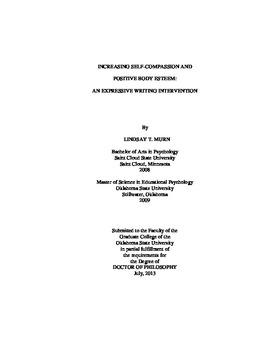| dc.contributor.advisor | Harrist, R. Steven | |
| dc.contributor.author | Murn, Lindsay T. | |
| dc.date.accessioned | 2014-09-24T14:17:01Z | |
| dc.date.available | 2014-09-24T14:17:01Z | |
| dc.date.issued | 2013-07 | |
| dc.identifier.uri | https://hdl.handle.net/11244/11029 | |
| dc.description.abstract | The purpose of the present study was twofold: The first objective of this study was to investigate the relationships between self-compassion, self-esteem, body esteem, and body comparison; the second objective was to test the effectiveness of an expressive writing intervention for fostering self-compassion and positive body esteem. Part 1 of this study included a diverse sample of 299 graduate and undergraduate students (98 Male, 201 Female) from a large southwestern university. Results indicated that higher levels of self-compassion, self-esteem, and body esteem are positively correlated, and all negatively correlated with frequency of body comparison. Additionally, results suggest that self-esteem may account for the correlations between self-compassion and body esteem, and self-compassion and body comparison, indicating body esteem and body comparison may be subsumed under the broader definition of self-esteem. This finding warrants an exploration of body attitudes that relate to self-compassion. A new concept - body compassion - is introduced, which would incorporate dimensions of self-compassion into one's perception of body. Women reported lower body esteem and a higher frequency of body comparison than men did. Women reported higher levels of common humanity as well. Further, age and education level differences, indicated that younger participants and those earlier in their college career experienced lower levels of self-compassion and self-esteem, and a higher frequency of body comparisons than older cohorts. Of those 299 participants, 28 completed part 2 of the study and were randomly assigned to either a Best Possible Self (BPS) writing topic condition or a control writing topic. Measures were administered after three days of writing and at 6-10 weeks later. Self-compassion, body esteem, and body comparison were not improved through this method of writing. However, self-esteem was found to have increased significantly after writing, suggesting that writing about one's Best Possible Self may be an effective means of increasing self-esteem. Limitations of the study and directions for future research are discussed. | |
| dc.format | application/pdf | |
| dc.language | en_US | |
| dc.rights | Copyright is held by the author who has granted the Oklahoma State University Library the non-exclusive right to share this material in its institutional repository. Contact Digital Library Services at lib-dls@okstate.edu or 405-744-9161 for the permission policy on the use, reproduction or distribution of this material. | |
| dc.title | Increasing self-compassion and positive body esteem: An expressive writing intervention | |
| dc.contributor.committeeMember | Romans, John S. C. | |
| dc.contributor.committeeMember | Boswell, Donald | |
| dc.contributor.committeeMember | Clark, Julie | |
| dc.contributor.committeeMember | Miller, Janice | |
| osu.filename | Murn_okstate_0664D_12900.pdf | |
| osu.accesstype | Open Access | |
| dc.type.genre | Dissertation | |
| dc.type.material | Text | |
| thesis.degree.discipline | Counseling Psychology | |
| thesis.degree.grantor | Oklahoma State University | |
